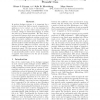Free Online Productivity Tools
i2Speak
i2Symbol
i2OCR
iTex2Img
iWeb2Print
iWeb2Shot
i2Type
iPdf2Split
iPdf2Merge
i2Bopomofo
i2Arabic
i2Style
i2Image
i2PDF
iLatex2Rtf
Sci2ools
111
click to vote
ANLP
2000
2000
Predicting Automatic Speech Recognition Performance Using Prosodic Cues
In spoken dialogue systems, it is important for a system to know how likely a speech recognition hypothesis is to be correct, so it can reprompt for fresh input, or, in cases where many errors have occurred, change its interaction strategy or switch the caller to a human attendant. We have discovered prosodic features which more accurately predict when a recognition hypothesis contains a word error than the acoustic con dence score thresholds traditionally used in automatic speech recognition. We present analytic results indicating that there are signi cant prosodic di erences between correctly and incorrectly recognized turns in the toot train information corpus. We then present machine learning results showing how the use of prosodic features to automatically predict correct versus incorrectly recognized turns improves over the use of acoustic con dence scores alone.
Related Content
| Added | 01 Nov 2010 |
| Updated | 01 Nov 2010 |
| Type | Conference |
| Year | 2000 |
| Where | ANLP |
| Authors | Diane J. Litman, Julia Hirschberg, Marc Swerts |
Comments (0)

